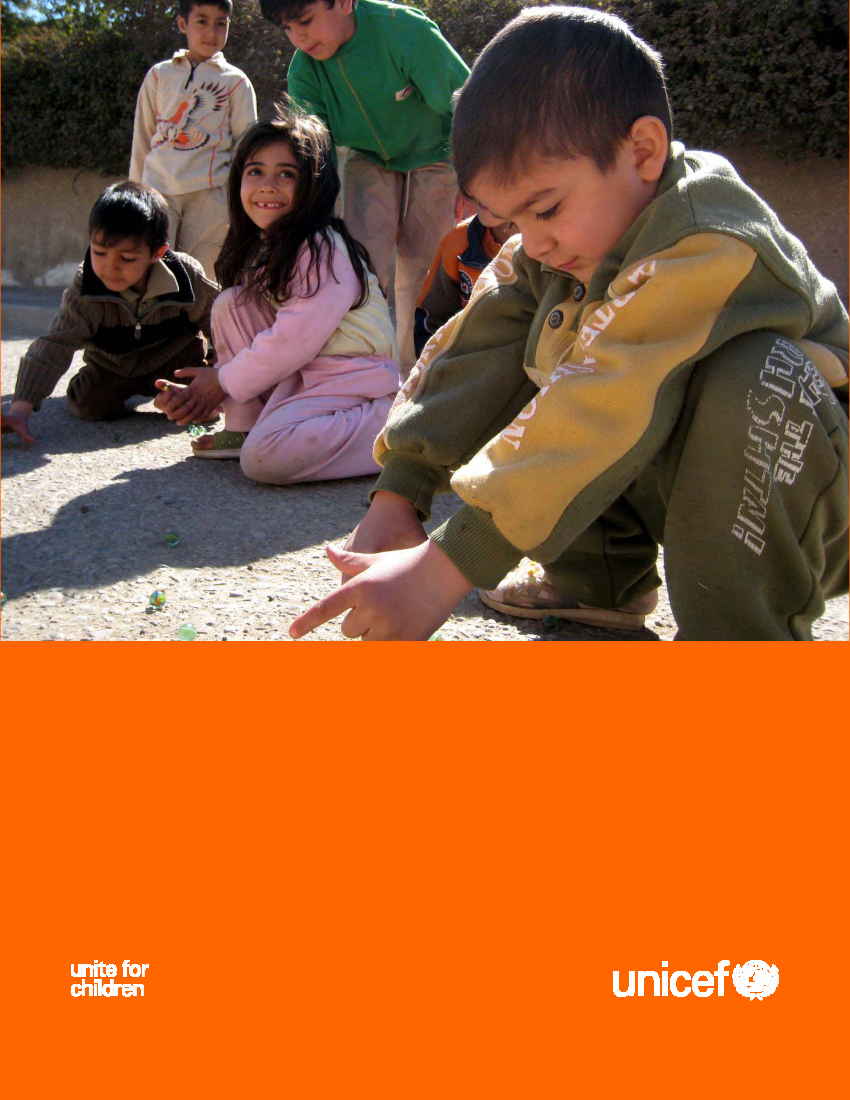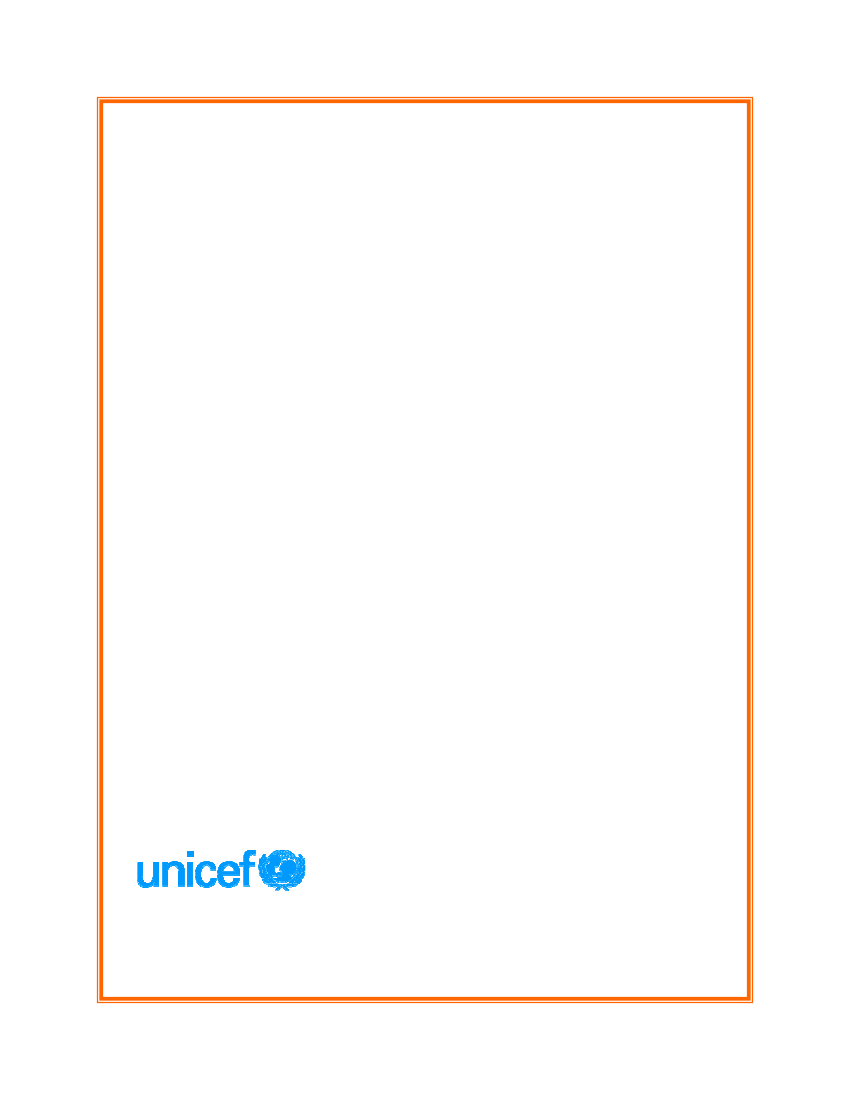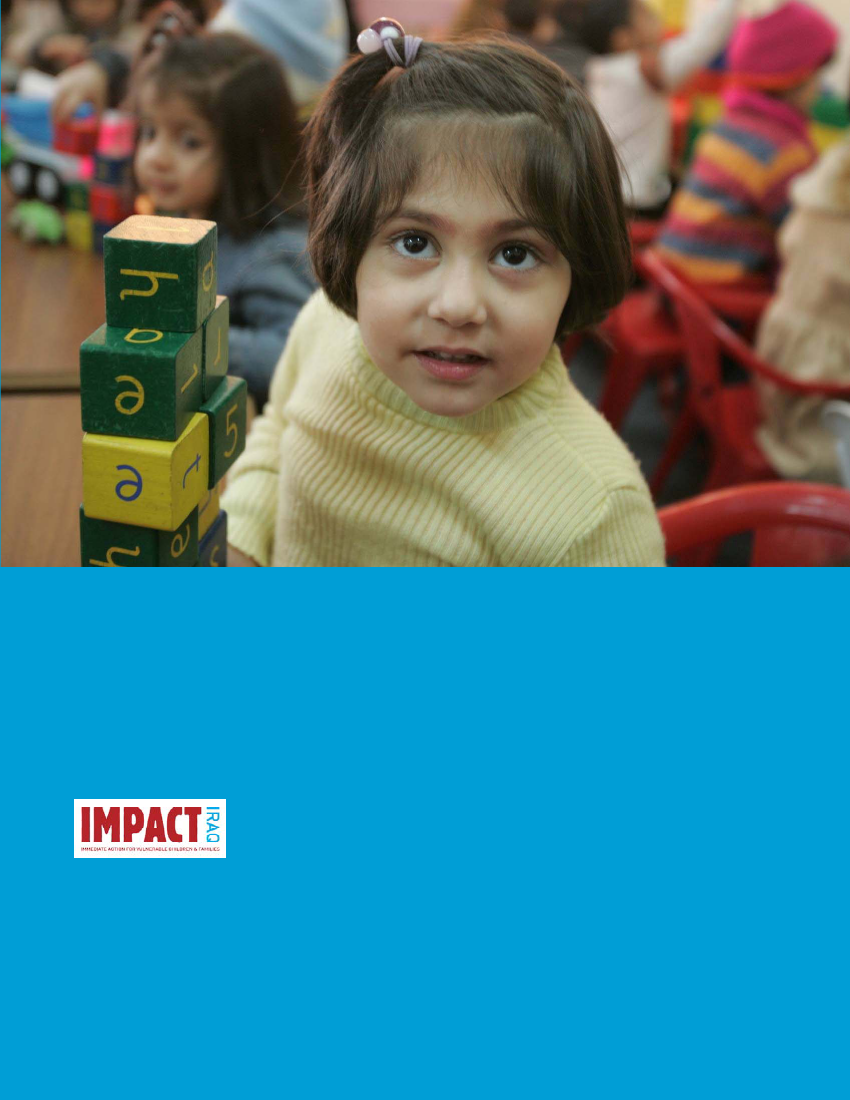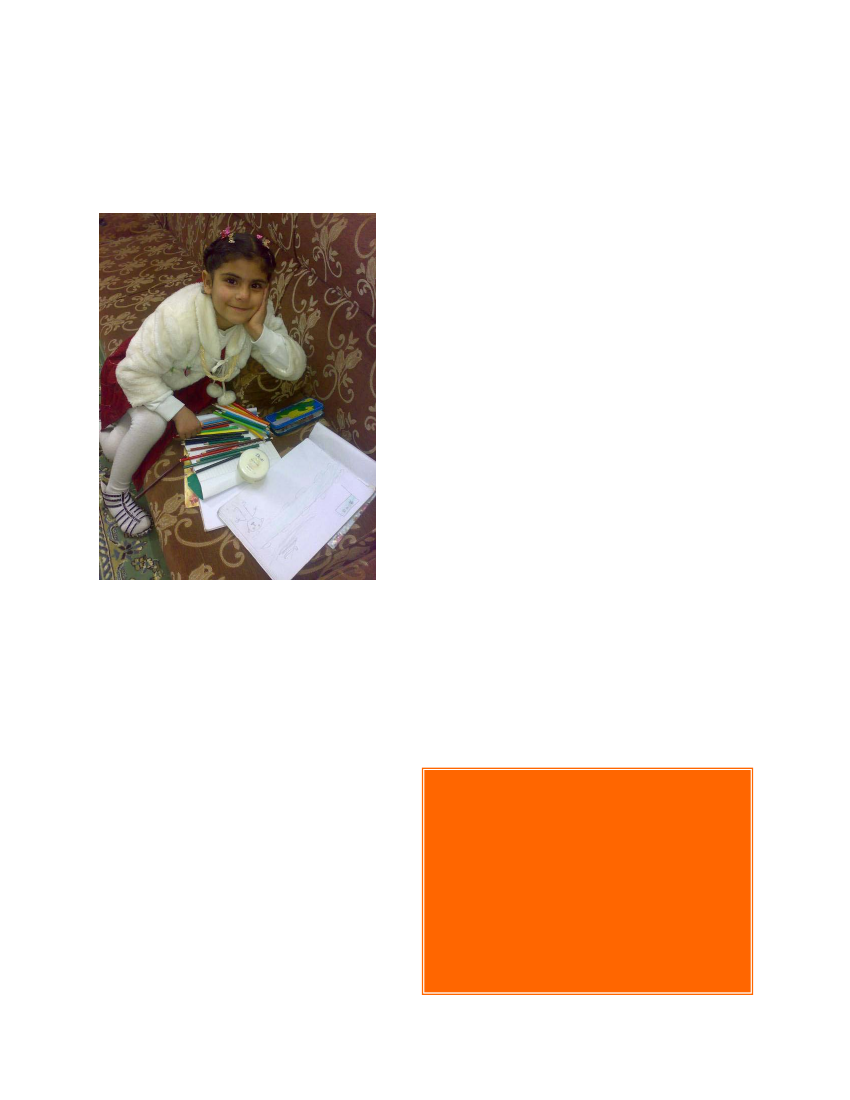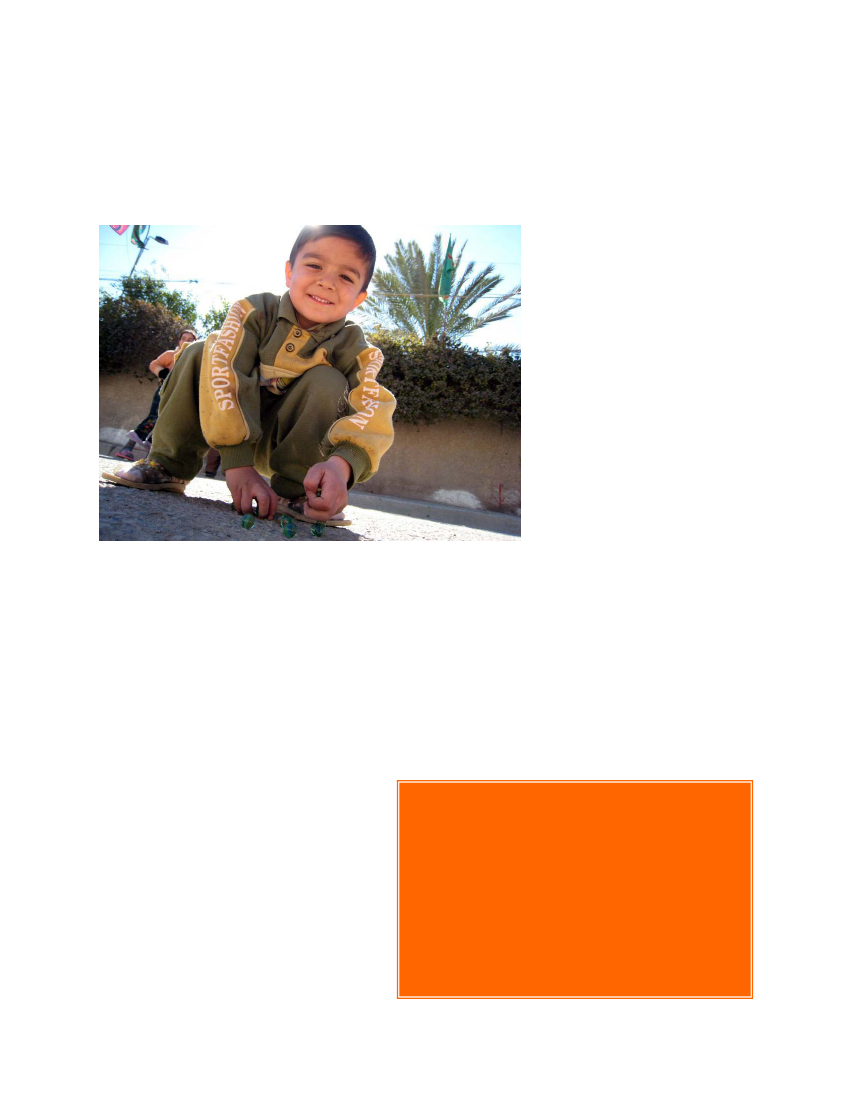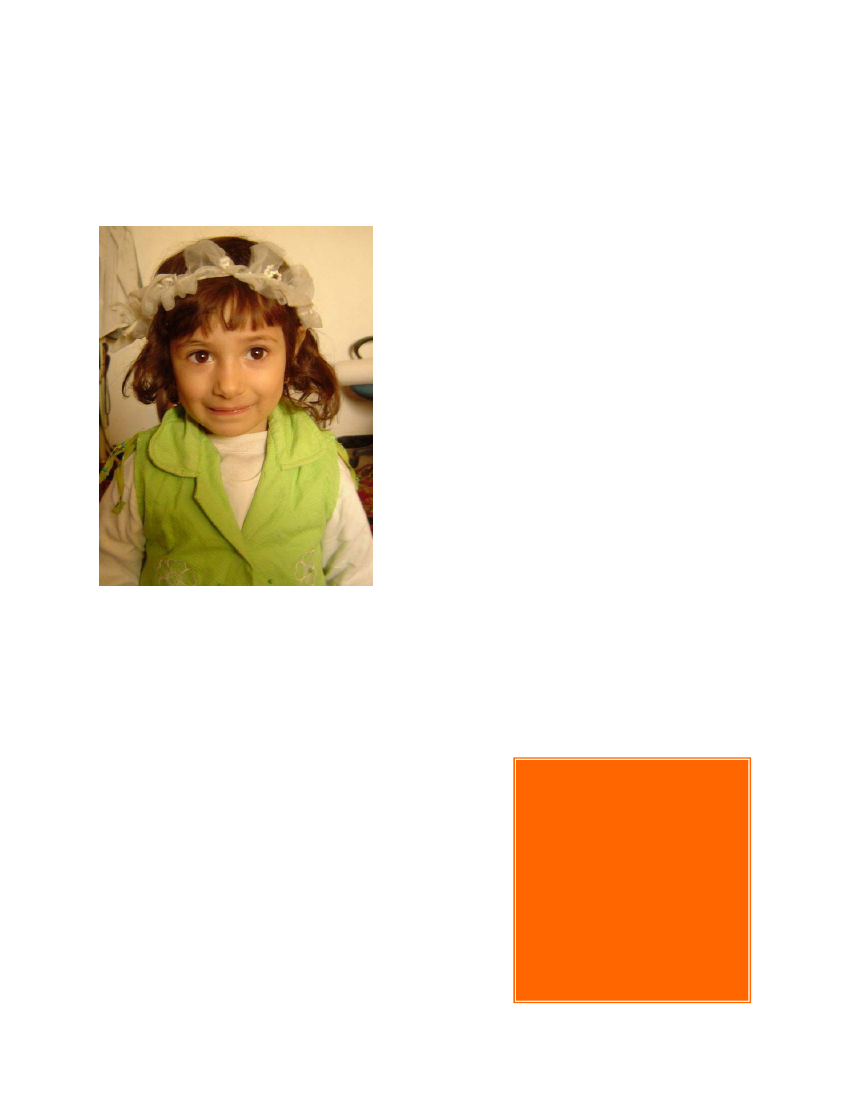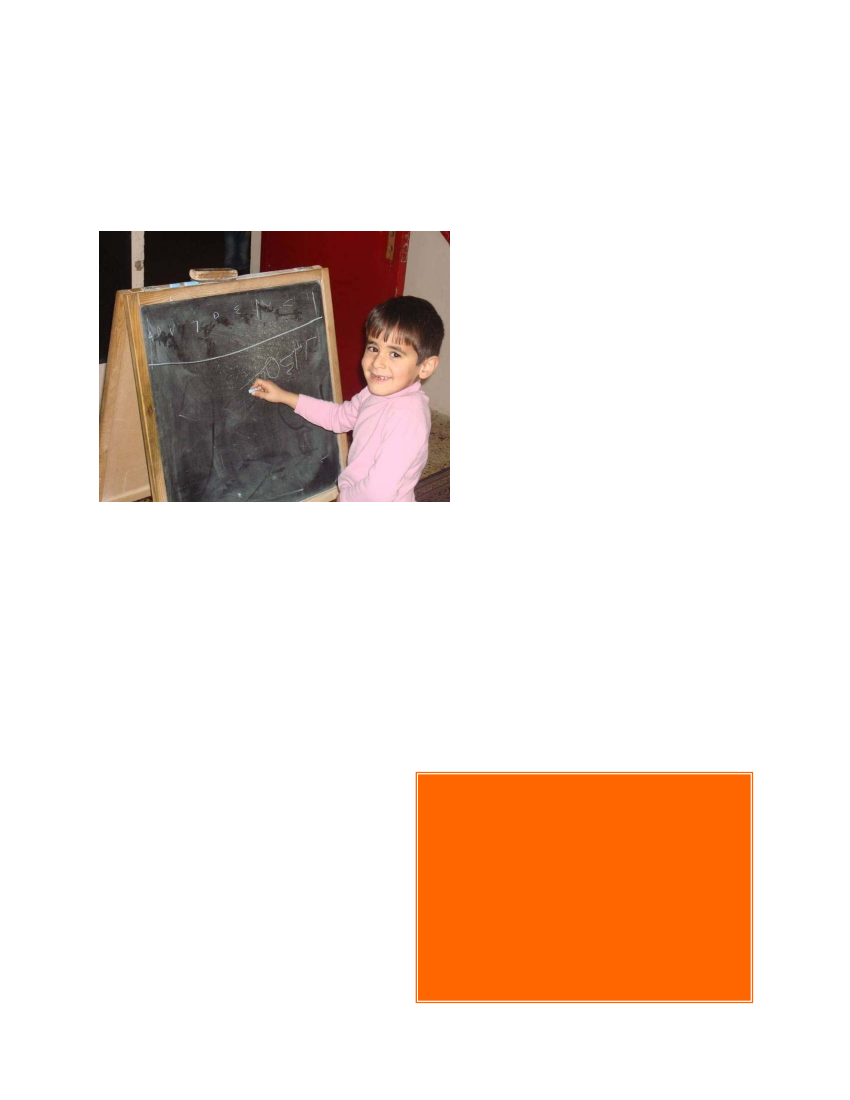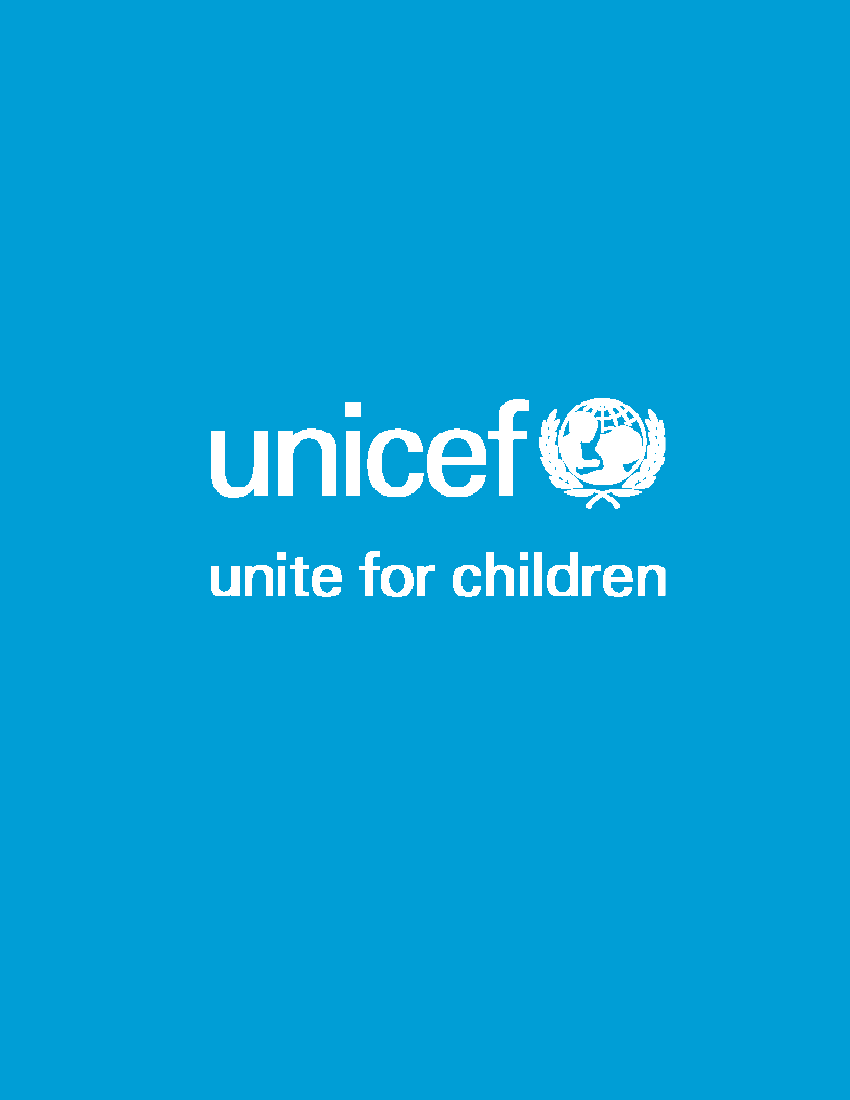Udenrigsudvalget 2007-08 (2. samling), Det Udenrigspolitiske Nævn 2007-08 (2. samling)
URU Alm.del Bilag 82, UPN Alm.del Bilag 53
Offentligt
Five Years Old in Iraq
A child’s fifth birthday is a special occasion. As every mother knows, the first fiveyears are the most vulnerable and important of a child’s life. They are the foun-dation for a healthy future and fulfilled potential.Young bodies and minds develop dramatically during this time, relying on propernutrition and good feeding practices at home. By five, child should be fully pro-tected against the main vaccine-preventable diseases. Other common illnesseslike diarrhoea and pneumonia also become less life-threatening. Most childdeaths from preventable causes occur during these fragile early years.At five years old, a child is about to enter a new world of exciting challenges – ofschool, of participation in community life and plans for the future. Preparing atoddler mentally and physically for this second phase of their childhood is a chal-lenge for every parent.But in Iraq these challenges can be overwhelming. Too many families struggle toaccess the basic support they need: quality health care, nourishing food, kinder-gartens and security in their communities. They fear that their children’s futuremay be slipping away.The Convention on the Rights of the Child, the world’s most ratified document,guarantees children’s fundamental rights even in times of conflict. It grants spe-cial consideration and protection to children affected by conflict, to protect themfrom harm and safeguard their growth and development.These conditions are not being met for children in many parts of Iraq. And yet,in some areas – and against the odds – Iraqi children are thriving.This report features mothers from south, central and northern Iraq whose chil-dren will celebrate their fifth birthday this year. Their stories offer a glimpseinto the many faces of childhood in Iraq today.The living situations and experiences may be different, but each story is linkedby a common thread. Parents deeply cherish their children and wish only to pro-vide the better future all children deserve. UNICEF, through its ongoing work inIraq, is committed to doing whatever we can to help Iraq’s mothers and fathersachieve this goal.
2
UNICEF in Action – IraqUNICEF has been on the ground inside Iraq since 1984, providing children and women with vitalhumanitarian relief and bringing them the essentials of a better life. Today, programmes sup-ported by UNICEF are reaching millions of Iraqi children with a package of critical care - improv-ing basic health services, promoting quality education, rebuilding water and sanitation systems,protecting children from abuse and exploitation, and advocating for their best interests.UNICEF’s humanitarian action network, IMPACT: Iraq, is also deliveringrapid emergency responses to children and families in crisis, relieving im-mediate suffering and promoting early recovery.
3
Searching for healthcareMeriam , 28 years, and her five years old daughter Fatima in Basra of southernIraqFatima was only two months old when war brokeout. My eldest son Mohammed was then five andAbdullah was two. Both were delivered and raisedsmoothly.In Fatima’s earliest months I was afraid that shewould fall sick, because the electricity had beencut and it was impossible to find a doctor afterdark. I put her clothes and milk in a special hidingplace in case of an emergency.We heard rumors about mothers losing their chil-dren to diseases or to bombs. There was shootingin the streets. My children’s safety at that timewas my biggest concern.As soon as hostilities eased slightly, childrenstarted to go to school and people went back towork. I decided to take Fatima to the health cen-tre as her vaccination dose was overdue. Doctorsand nurses were happy to see us, and would smilewhen we came in. It was reassuring for us! We allthought that suffering was finished and that prosperous times were coming. It was good tosee Fatima was healthy. She got all her doses of vaccines that year.But in the next years of her childhood, we felt this hope begin to slip away. There was awindstorm of violence, lawlessness and unemployment in my area. My husband’s salary inthe past was sufficient enough to meet our needs and still leave a little for ourselves. Butnow we have to spend most of the family income on electricity, water and fuel. We have tobuy water because the supply near our home is not good. There is very little for food andother household requirements.The quality of healthcare at public hospitalshas diminished seriously. So when Fatimagets sick now, I have to take her to privatedoctors and pay for the examination, testsand medicine. When she was a baby, I couldget these services for free. I am also afraidto travel out to the health centre becausethere are threats to women on the streets. Ican never travel after dark. Thank god I amnot pregnant now, because then my unbornbaby would really suffer from lack of properexams and ante-natal care.4
“Children in Iraq pay the price forconflict when insecurity cuts themoff from access to the most basichealth services. Therefore, we arecommitted to ensure that the mostvulnerable children, not only thosewe have easy access to, do not missout”.Alexander MalyavinChief, Survival, Growth and Development
I am determined not to give up for my little daughterand my other children. So I decided to go back toschool and qualify to become a teacher. My husbandwas extremely supportive. He helped me sit for theexternal baccalaureate exam and join the teachers’institute. I am going to teach mathematics, as soonas I can find a job. When Fatima is old enough, she isgoing to go to school and become educated, so thatshe has the chance of a better life than this.
“The quality of healthcare atpublic hospitals has dimin-ished seriously. So whenFatima gets sick now, I haveto take her to private doctorsand pay for the examination,tests and medicine”.Meriam, Fatima’s mother
I cannot remember a time when we witnessed a truecalmness . We Iraqis have been through wars, sanc-tions and this last conflict that dragged on for five years now. There is hardly any familynot affected with loss and bereavement.I am concerned about Fatima’s attitude towards life and the effect of growing up in such aviolent environment. In Eid (feast) holidays, her brothers want to buy toy machinegunsand laser guns. They play games simulating war and killing.When we were at their age, we had completely different toys such as construction toys,puzzles, jump ropes and balls that involve physical activity or imagination and creativity. Iknow that when Fatima starts school soon, she will hear about violence from her friendsand I hope the teachers can give her the right support and guidance.Children as young as Fatima are at the very start of their life. They need to be given ourbest attention so these current conditions do not harm their development. I think this canonly be done of the family and school work together. We need help. Every day I look at mydaughter and wish for her and all our children to live their childhood in peace and grow upto become good assets for our country.
Support for Survival and GrowthAcross Iraq, UNICEF’s health and nutrition programmes help children as youngas Fatima get a better start to life. Working with WHO, UNICEF supports Iraq’shealth system to deliver lifesaving basic care to children from before birththrough adolescence, and promote the health and survival of mothers.With UNICEF and WHO support, 90% of Iraq’s 4.8 million children under five havebeen continually immunized against polio during the National Immunization Days,while reported cases of measles, mumps and rubella among under five years old chil-dren have dropped remarkably.UNICEF initiative to improve the health and nutritional status of children and womenthrough the fortification of wheat flour with iron and folic acid is helping to combatanaemia, a leading cause of pregnancy-related complications and maternal deaths.UNICEF has been rehabilitating and constructing Primary Health Care centres,Maternal and Child Health units throughout the country. UNICEF also providesemergency supplies and basic equipment to these facilities in remote and under-served areas as well as Oral Rehydration Salts and other basic essential drugs .5
Trying to nurture a young mindAmal, 32 years, lives in Baghdad with her five years old son, BaqirBaqir was born in mid May2003. At that time, the coun-try was still chaos. I was de-pressed after my delivery andfound it hard to breastfeedBaqir as I did with his eldestsiblings. The doctor said thatstress was to blame.But a mother has to be strongfor her children. I got back nomy feet and gave Baqir extraattention to make up forthose early days. I learnedfrom the health centre tokeep children as healthy asmuch as possible by keepinghim warm, feeding him prop-erly and completing his vacci-nation doses.It’s more important now to keep children healthy because the costs are too high if they fallsick. Public hospitals are longer providing good services, specialised doctors have fled thecountry and medicines are not subsidized any more. Private clinics charge high prices.I thank God for two blessings; my children are so far safe and healthy and they are alsoclever at school. Despite all odds, the school of my children is run by a very dedicatedheadmistress, she follows up on every single child’s attendance and investigates on thereason if a child fails to show up one day. All parents in the neighbourhood are grateful forthis lady and they owe her all respect. We are fortunate to have our children go to a schoolwere they learn the difference between good and bad thinking and behaviours in additionto their school subjects.Unlike schools in other parts of thecity, my children attend sports and artsclasses which they enjoy and benefitfrom. Though the attendance is fre-quently interrupted by security inci-dents, curfews and prolonged holidays,the teachers volunteer to give extratime to make for the lost classes.But my little one, Baqir, doesn’t go tokindergarten. I know how importantthis could be for his development butthe nearest kindergarten is far away
“The key elements of a secure, happy
childhood - school, healthcare, playing
with friends and a stable family envi-
ronment – are being pushed farther
out of reach by war, ongoing violence
and displacement”.
Nasreen TahaUNICEF Education Facilitator6
from our home and to reach there we need tocross a checkpoint. I am afraid my children couldbe attacked or kidnapped on the journey there.Baqir’s siblings learned the ABC, numeration,songs and many useful things at kindergarten –but this has become a luxury these days. We arewaiting for an opportunity to give him some kindof stimulation for his mind, otherwise how will hebe ready for school?
“But my little one, Baqir, doesn’tgo to kindergarten. I know howimportant this could be for hisdevelopment but the nearestkindergarten is far away fromour home and to reach there weneed to cross a checkpoint”.Amal, Baqir’s mother
It’s hard to see how our living conditions will im-prove without help. Uninterrupted electricity hasbecome a thing of the past. Water supplies arealso a problem here. Streets are littered with piles of garbage and pools of sewage. Thewalls built to stop violence in communities have also stopped me taking Baqir to the healthcentre when he needs to go.My children are my strength and joy. Raghda and Noora want to become teachers just liketheir headmistress. Young Baqir is just old enough to play marbles and wants to becomeIraq’s marbles champion. He has a small bicycle but he cannot ride it outside our smallgarden. Baqir knows that this is one rule that a little boy cannot break!
Support for Early Childhood DevelopmentIraq’s young children, like Baqir, need better support and care to help them cope withthe stress of their environment. They also need stimulation for their developing minds,to encourage their intellectual growth and prepare them for the best start at school.Through UNICEF’s Early Childhood Development (ECD) programme, children in over2,400 kindergartens and primary schools nationwide are receiving early learning andstimulation. The ECD programme provides education and recreational materials foryoung children and trains caregivers and teachers on the healing effects of play andart on young children.UNICEF’s Integrated Community Initiative for Children (ICIC) is also working withcommunities, teachers and local authorities to improve school facilities in six ofIraq’s most deprived governorates — so children like Raghda and Noora can learn ina safe, friendly environment. Through the ICIC, schools are receiving new and up-graded toilets, classrooms and playgrounds, better school furniture and essentiallearning and teaching materials. Many of the schools participating in this initiativeare also hosting large numbers of additional pupils displaced by violence from otherparts of the country.
7
Need for psychosocial supportRafiaa , 42 years, and her five years old, Raheeq, live in Mosul in northernIraqI have been volunteering to work in the PolioNational Days for eight consecutive years.We have become experienced vaccinators,but the campaigns that preceded the warwere more relaxed and safe.I fell pregnant with Raheeq in early 2003. Iwas frightened, thinking all the time that Imight be in situation when I need doctor’sassistance and I could not get it. Thankfully Idid not go into labour until the quiet timeafter the conflict. When I felt the pains start,my husband took me to the nearby hospitalwhere I gave birth to my beautiful daughterand was discharged safely.Raising Raheeq and now also my littlest one,Ahmed today is not easy compared to myeldest kids. When she gets sick in the night Icannot take her to hospital. Medicine is nowexpensive, where it used to cost nothing. Inthe last few years it has been harder to getyoung children their vaccinations on time –even though I am a health worker. Raheeq has just finished her routine schedule,which is already very late.But what worries me most is that Raheeq is growing up seeing so much violence andsigns of conflict. Until recently, Mosul was less violent compared to other gover-norates in the centre and south. But last summer, there were many bombings here,making us think that we would soon be just like Baghdad.Raheeq is still very young to understand what is goingon in her world. The sight of military vehicles in thestreet frightens her and she knows words that no childshould say – like car bomb and suicide bomber. Sheworries about her sisters while they are at school duringthe day. She keeps on asking “When will Noor andFarah return from school? Will they be kidnapped?”When I was a child I heard of these things only in actionmovies.Consultants specialised in children’s behaviour are veryrare in the country, therefore I try to undertake thistask myself. Raheeq likes to draw so I give her drawingassignments to help her express her mind and get rid of8
“The decline in accessto and quality of learn-ing, and the appallingpsychosocial impact ofconflict, appear to havethe most alarming im-plications for Iraq’s fu-ture”.Fatuma IbrahimChief , Child Protection andParticipation
fearful thoughts. She has a nice voice that she likesto sing children’s songs and we sing together.sing children’s songs and we sing together.I think about Raheeq’s future and wonder if I will beable to send her to our local school. The police sta-tion is close to the school and I worry that if the sta-tion is attacked she might be hurt. Each time I hearand explosion, I rush to the school to make sure thatmy older children are safe. But then I think that thechildren’s school is their one chance to learn andhave fun, see their friends – so how can I keep themout?
“Raheeq is still veryyoung to understand whatis going on in her world.The sight of military vehi-cles in the street frightensher and she knows wordsthat no child should say –like car bomb and suicidebomber. She worriesabout her sisters whilethey are at school duringthe day”.
I believe my children have been raised by caring andRafiaa, Raheeq’a mothereducated parents – but even so, they have sufferedfrom this violence. My heart breaks for those poorchildren like Raheeq who do not have parents – theorphans and displaced ones at camps around the country. We need a break of peace andsafety to help us nurture our children’s present life and their future.
Psychosocial SupportUNICEF continues to strengthen Iraq’s capacity to provide care and protection for thevulnerable children affected by conflict. UNICEF supported the development of astrategy and resources for psychosocial support and care in schools and communitiesThis programme is focuses on home, school and community-based interventions forboth children and their caregivers, including teachers and social workers. It is a corepart of UNICEF’s humanitarian response for children in crisis.
9
Seizing the chance for a brighter futureZainab, 36 years, lives in Dohuk in northern Iraq with her five years old sonOmedI was in my 7thmonth of my pregnancywhen war broke out. We fled to the vil-lage in the rural areas of Dohuk be-cause it was safer to stay away fromthe city centre. My husband, an officerwith the Peshmerga, couldn’t join ussince he was on duty alert in Erbil. Theweather was extremely cold and damp.We didn’t have clean water and I feltsick.The doctor at the hospital told me that Iwas affected with mumps and put meon a strong course of antibiotics andmedications that caused me to bewasted. Telephones were operationaland I lost track of my children and hus-band for one week. But finally, once the conflict stopped, we were united again.In June I gave birth to Omed, the nurse told me the baby was very weak because of myillness and lack of nutrition during pregnancy. We helped him start to breastfeed and hebegan to flourish.Things have been getting slowly better since then. My husband is away for work a lot, so Iam both father and mother to Omed, as well as my own work as a deputy headmistress atour local school. In a way, I am the mother of 300 children!We are lucky that services for children are improving in this whole region. In particular wefind that the immunization process is perfect in Dohuk. The campaigns always take placeon time and vaccinators travel to the farthest spots in our governorate. If a child is missed,vaccines are available at health centres at any time. Omed has finished his schedule andeverything is recorded in his health card.Water supplies are also improving so Idon’t have to worry any more about thechildren getting diarrhea. But electricity isstill very bad, we rely on generators com-pletely.Families here are very keen to educatetheir children, even little ones like Omed.You can hardly find a child out of schoolthese days. In my area, there are moregirls in school than boys now. This is avery positive sign. But unfortunately10“Iraq’s schools are in urgent need ofsupport, both in terms of access toschooling and the quality of learningchildren receive. Well-educated chil-dren represent our best chance to liftIraq into a future of security andhope”.Mette NordstrandChief , Quality Learning and Development
school infrastructure still needs a lot ofrepair. Some schools are in good shapebut the rest are very bad. In winter, rainleaks in and children get wet in theirclassrooms. Toilets are a particular prob-lem. I want Omed to be able to go andstudy at a decent school building wherehe feels warm and comfortable.
In general, I think the future is brighterfor Omed than it was for my other chil-Zainab, Omed’s motherdren. Kurdistan, and Dohuk in particular,has been completely safe. The city is re-building. Salaries are going up. We do stillhave a long way to go to fix all our electricity, find clean water and dispose of sewage. Butas long as things stay good here, I think we can make progress.I am sad that I cannot travel to other cities of Iraq as we used to do in the past. I could goto visit my friends in Mosul or see a doctor in Baghdad before the war, but now this is toodangerous. People are also concerned that violence would come closer to us if things getworse in Mosul, which is next door to Dohuk. Omed is only young but I pray that he willinherit the stability and peace of mind we have long dreamed of. I look in his eyes and seeour potential for a good future.
“Some schools are in good shapebut the rest are very bad. In winter,rain leaks in and children get wet intheir classrooms. Toilets are a par-ticular problem. I want Omed to beable to go and study at a decentschool building where he feelswarm and comfortable”.
Quality Learning and DevelopmentUNICEF works wit partners across Iraq to provide children with the essentials of aquality education, from school books and pens to child-friendly classrooms andwell-trained teachers. UNICEF has helped to rehabilitate over 1,200 schools in Iraqsince 2003, including installation of safe drinking water and separate toilets forgirls who might otherwise be unable to attend.UNICEF trains teachers and Ministry of Education officials to promote education andstimulation in pre-school children. This work also promotes child-friendly teachingmethods and psychological care to make schools safe havens for children who haveexperienced trauma. To support the most vulnerable children, UNICEF is workingwith Iraq’s government to provide a non-formal education system which has so farreached nearly 50,000 children prevented from attending school because of insecu-rity or poverty.
11
12
